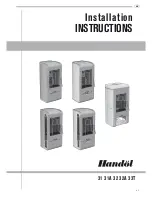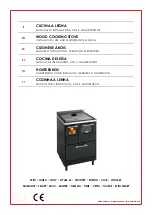
14
OPERATING INSTRUCTIONS
OPTIMAL FUEL CONSUMPTION
This stove is designed to get the most ef
fi
cient transfer of heat energy from the wood fuel and radiate it into your living en-
vironment. The
fi
re box introduces combustion air through three sources. (1) Immediately beneath the door opening below
the window is a Lower Primary Air Ori
fi
ce (LPAO). (2) The door air inlet control brings air into the
fi
rebox and controls the
rate of burn (and the amount of heat the stove radiates). (3) The secondary air tubes at the top of the
fi
rebox are designed
to ignite the combustion gases (smoke) given off by the burning wood and increases the ef
fi
ciency of the stove and re-
duces chimney emissions. Smoke given off by burning fuel consists of very small organic liquid droplets. If these droplets
condense, they form a sticky tar-like substance called creosote. When operated properly, this stove is designed to burn
these droplets. Burning these droplets releases heat that would otherwise be lost up the chimney as smoke. Following the
instructions below will help you operate your stove properly to maximize the stove’s performance. Actual performance is
dependent on chimney height, weather, log size, wood species and moisture content. Some experimentation will initially
be required to
fi
nd that “sweet spot” where your stove performs best. The following will give you a starting point to
fi
nd
your optimum settings.
When
fi
rst loading fuel set the door air inlet control at the wide open position for at least 15–20 minutes. When the stove
is working properly you should be able to observe secondary combustion
fl
ames above the fuel pieces in front of the
secondary air tubes at the top of the
fi
rebox. These secondary
fl
ames should continue to burn after the primary air inlet
is reset from wide open to the desired operating setting. If the
fl
ames do not continue to burn, open the air control to re-
establish the secondary
fl
ames then slowly reset the air control to the desired setting. Initially it may take several attempts
to
fi
gure your stove out. But once you
fi
nd the operating “sweet spot” and the correct mix of procedures to get there, only
minor adjustments will be necessary. The best indicator of a properly operating stove is to look for smoke coming out of
the chimney. You may see steam emissions that will quickly dissipate. Smoke will thin but continue to drift without totally
disappearing. If you do detect smoke emissions, open the air control a little bit, let the stove adjust for 10–15 minutes and
re-check your chimney. Remember – visible smoke represents lost heat.
NOTICE - INITIAL BURNS TO CURE PAINT Because of the high operating temperatures, this stove uses a special high-
temp paint which requires a series of burns to cure the paint for durability and a lifetime of service. Proper curing of the
high-temp paint requires a series of three initial burns. The stove should be allowed to cool off between each burn. The
fi
rst two burns should be small
fi
res and low temperatures (250 degrees F) for a duration of 20 minutes each. The third
fi
re
should be at a medium-high temperature (500 F to 700 F) for twenty minutes. Provide adequate cross ventilation to clear
any smoke or odor caused by initial
fi
rings.
TAMPER WARNING
This wood heater has a manufacturer-set minimum low burn rate that must not be altered. It is against federal regula-
tions to alter this setting or otherwise operate this wood heater in a manner inconsistent with operating instructions in this
manual.
EFFICIENCIES
Ef
fi
ciencies can be based on either the lower heating value (LHV) or the higher heating value (HHV) of the fuel. The lower
heating value is when water leaves the combustion process as a vapor, in the case of woodstoves the moisture in the
wood being burned leaves the stove as a vapor. The higher heating value is when water leaves the combustion process
completely condensed. In the case of woodstoves this would assume the exhaust gases are room temperature when leav-
ing the system, and therefore calculations using this heating value consider the heat going up the chimney as lost energy.
Therefore, ef
fi
ciency calculated using the lower heating value of wood will be higher than ef
fi
ciency calculated using the
higher heating value. In the United States all woodstove ef
fi
ciencies should be calculated using the higher heating value.
The best way to achieve optimum ef
fi
ciencies is to learn the burn characteristic of you appliance and burn well-seasoned
wood. Higher burn rates are not always the best heating burn rates; after a good
fi
re is established a lower burn rate may
be a better option for ef
fi
cient heating. A lower burn rate slows the
fl
ow of usable heat out of the home through the chim-
ney, and it also consumes less wood.
NOTICE: USE SOLID WOOD MATERIALS ONLY. DO NOT BURN GARBAGE OR FLAMMABLE FLUIDS SUCH AS
GASOLINE, NAPHTHA OR ENGINE OIL. DO NOT USE COAL. THIS STOVE IS NOT DESIGNED TO ACCOMMODATE
THE AIR FLOW (DRAFT) NECESSARY TO PROPERLY BURN COAL OR COAL PRODUCTS. DO NOT ELEVATE
FIRE OR USE GRATES OR ANDIRONS. BUILD FIRE DIRECTLY ON BOTTOM OF FIREBOX.










































